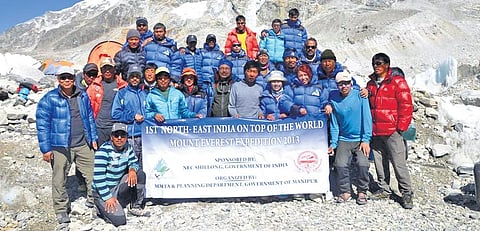

MANIPUR : A scientist at Manipur government’s planning department and a passionate mountaineer who trains other adventurers, Leishangthem Surjit has to now conquer a mountain of a different kind — he has to rebuild his institute vandalised during the ethnic clashes in the state, writes Prasanta Mazumdar
Science taught him to be precise with latitudes and longitudes. Nature made him overcome challenges to conquer altitudes. Raw love drove Manipur’s Leishangthem Surjit to adventure sports, particularly mountaineering. In the past many years, the 56-year-old passed on his knowledge to hundreds of youths. One among them is Anshu Jamsenpa, the first Indian woman from Arunachal Pradesh to scale the Mount Everest five times.
Surjit is a scientist at the Remote Sensing Application Centre, an autonomous institute attached to the Planning Department of Manipur government. His job entails dealing with satellite imageries. A PhD degree holder, he is associated with the Manipur Mountaineering and Trekking Association (MMTA).
Surjit said he joined MMTA in 1983, three years after it was established, so he could go out on trekking. There has been no looking back since.
“As a schoolboy in 1980, I heard about MMTA taking 300 boys and girls for a long trek in Ukhrul district. The next year, another group of 200 boys and girls were taken to a place near the Myanmar border in present-day Tengnoupal district. I got a chance to go on a trek in 1983 when another group of boys and girls were taken to Churachandpur district,” Surjit told this newspaper.
“Mountaineering, or for that matter any adventure sport, teaches you leadership qualities, discipline, endurance, fraternity and life skills. You learn how to overcome obstacles, control a jungle fire around you, or escape if confronted with a wild animal or how you can get water if there is no water. We were taught by experts, including Army commandos,” he said.
It was in the mid-1980s that he got actively involved in mountaineering after having undergone courses outside the state. In 2013, he led the first Northeast Mount Everest expedition. Assam everesters Tarun Saikia and Manish Deka, besides Anshu, were part of the team.
“It was a successful mission. I went up to Camp 1, which is beyond the base camp. I too wanted to climb the summit but I couldn’t because I had the responsibility to look after the others in the team,” Surjit said, adding, “A mountaineer should know and love the mountains, their grade, environment, culture and ethics.”
As a trainer at MMTA-established Manipur Mountaineering Institute (MMI) in Churachandpur district, he trained budding mountaineers and adventure sportspersons from across the country, mostly Northeast. In November last year, 20 IAS probationers, including five females, underwent training at the institute. They were also taken to the Dzukou valley on the Manipur-Nagaland interstate border for trekking.
The MMI fell victim to the ethnic violence that broke out on May 3. “Assets worth `4-5 crore were dismantled one day and later burned down by miscreants. The locals of a small Kabui Naga village had donated 80 acres of land to set up the institute. We developed it with funds received from here and there, including the Ministry of Tourism,” Surjit said.
The institute had buildings, including a training centre, besides obstacle and rock climbing, and jungle survival sites.
The mountaineer said MMTA did a lot of work in ‘Sport Climbing’, a modern discipline originated from traditional rock climbing, in the Northeast. It was included in the 2020 Tokyo Olympics.
“We provide theoretical and practical knowledge in mountaineering. A lot of youths, who came in batches of 50-100, underwent courses in mountaineering and adventure sports at MMI,” Surjit, who was previously an associate member of Indian Mountaineering Foundation, said.
Courses in trekking, adventure camping and training, caving, parasailing, paragliding, para-motoring, water surfing, sail boating and rafting, were offered by MMTA at MMI.
Surjit has authored two books as well. He published his ‘Case Study of Problems and Prospects of Adventure Sports in Manipur’ in 2013 and ‘Everest Diary’ in 2014.
He insists that every sportsperson must undergo an adventure course, stating that it makes a youth “fertile”. “Adventure tests your endurance, courage and belief,” said the mountaineer, who trained youths in 85 adventure courses at MMI.
“The youth in India are a major resource for the nation. If harnessed effectively, they can be the leading agent of change and accelerated development of the country. However, if not handled properly, they can become a liability,” he said. “Where there is a will, there is always a way,” he said.